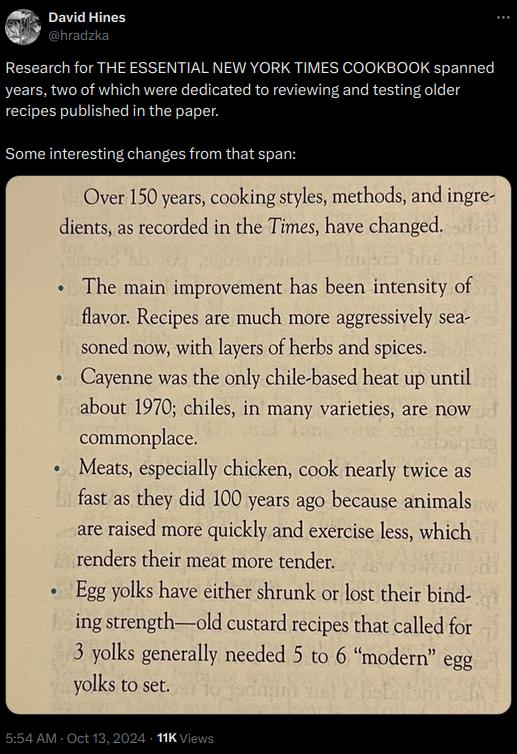this post was submitted on 13 Oct 2024
701 points (99.2% liked)
Science of Cooking
1119 readers
1 users here now
Welcome to c/cooking @ Mander.xyz!
We're focused on cooking and the science behind how it changes our food. Some chemistry, a little biology, whatever it takes to explore a critical aspect of everyday life.
Background Information:
founded 1 year ago
MODERATORS
you are viewing a single comment's thread
view the rest of the comments
view the rest of the comments

You're comparing animals with fat throughout the muscle to birds that don't. Also, the connective tissue only starts to break down once getting to about 192f and needs to hang out for a good while between there and 210 to slowly break down. That's not how your great great grandma cooked chicken. Also, steak was best 200 years ago as it is now. Cooked really fast with some red in the middle.
Methods changed because we got better at cooking.
No, I'm comparing the same species of animal. We've gone from 100+ day old birds weighing 2.5 lbs to 47 day old birds weighing 6.5 lbs in the last century. That seems comparable to the difference between old roosters for coq au vin or old dairy cattle for vaca vieja and their respective supermarket counterparts.
No, collagen starts to break down slowly as low as 130°F, but the breakdown speeds up as the temperature rises. There are ways to play around with this with different techniques, where doneness is more than just getting the meat to temperature. It's why poaching chicken used to be more common than it is today. It's why chicken wings taste best when double fried. It's why confit works so well for duck legs.
Ok, again, if you've ever had to work through cooking something like vaca vieja, you'll notice that it doesn't cook the same way as a steak that's been dry aged, or a regular steak at Costco, or a lean grass-fed steak. If your steak technique is the exact same for all of them, you're probably missing out.
And I'm guessing the NY Times wasn't exactly building this conclusion based on only steak recipes. 150 years is gonna have a lot of non-steak recipes in the mix.
That's part of it. But also, trends come and go. I'd rather have a 1950s cheeseburger than a 1990s cheeseburger, and much of the post 2010 scene has been re-implementing some old techniques that fell out of favor (smashing patties, simpler bread for buns, fewer toppings) and a backlash at some of those things that got out of control. Cocktails went through something similar too, with old classics coming back (either as is or with a new variation).
I'm sure any comprehensive catalog of recipes over decades is going to include some fads that fizzled out, like low fat stuff in the 90's, etc. It's not some kind of inexorable march of progress.